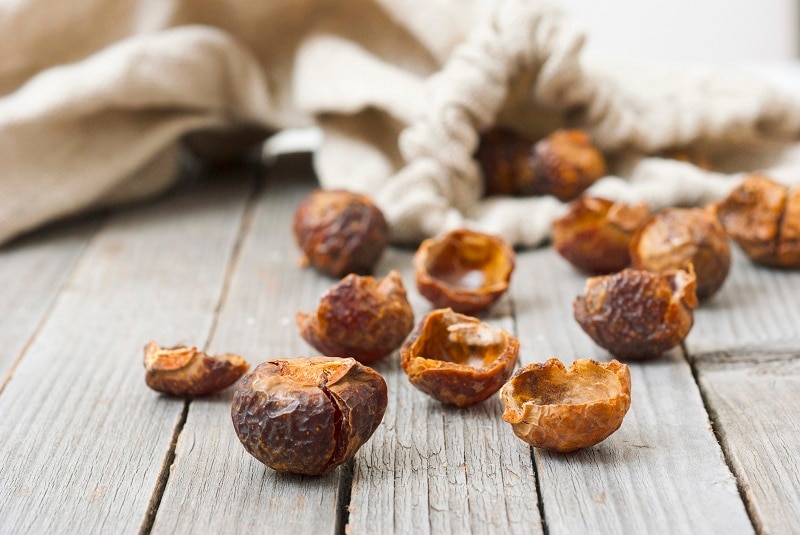Chemicals are hiding everywhere, including in the laundry room. Toxins in conventional detergents wreak havoc on our health. Luckily, there is a variety of natural laundry products on the market that will clean up (and green up!) your routine. One of them in particular has been around for thousands of years and is the perfect green alternative to traditional laundry detergents. Welcome soap nuts to the scene.
What are soap nuts?
Soap nuts aren’t actually nuts at all, but little fruit berries. The Sapindus Mukorossi tree, or soapberry, is part of the lychee family that grows in the Himalayas. They’re called soap nuts because they dry into hard, nut-like shells instead of squishy dried fruit.
The berries contain saponin, a natural soap that works like a detergent breaking down dirt and oils. They add cleaning power to wash clothes, dishes, surfaces, hair, skin, pets and other things.
Buying them in their whole form gives you a cost-effective natural cleaner that you can use many ways. You can also buy them in liquid form, but it’s easy to make your own from the whole berries.
Hypoallergenic, sustainable, completely biodegradable and 100 percent natural, soap nuts make the perfect addition to low-waste and zero-waste lifestyles.
Soap nuts are gentle on the skin, making it perfect for those with skin issues and sensitive baby skin.
How to use soap nuts
Soap nuts come with a fabric pouch. Add a few soap nut berries to the bag, seal it and drop it into your washer. Let them suds up as they’re agitated by the water and friction with your garments during the wash cycle, and they’ll work magic. Don’t overload the washer. Instead, leave room for the soap nuts and the clothes to move. The more friction, the better.
Be sure to remove pouch before switching clothes to the dryer.
No need for additional fabric softener either. The saponins in soap nuts released during the rinse cycle don’t leave a residue on clothes like synthetic detergents but instead act as a natural fabric softener opening up the fabric fibers leaving clothes fresh, fluffy and clean.
After the wash, save soap nuts to reuse for six to 10 additional washes. You’ll be able to tell when your soap nuts are ready to be replaced when they no longer feel soapy when added to hot water. They’ll also start to fall apart.
Once they’re no longer sturdy enough for the washing pouch, you can boil them with water to further break them down and create a washing liquid you can use to wash dishes. When they stop producing liquid, drop them in the compost.
Pro tips for first-timers
Suitable for top loading, front loading and high-efficiency washers, soap nuts can be used with any wash cycle. Hot water seems to be the secret to soap nut berry success. While they work in cold and warm water, hot water kicks its cleaning power into high gear, so use warmer water for heavily soiled items.
If a cold-water wash is preferred for soiled delicates, let the soap nuts sit in hot water right before the wash to trigger the extra cleaning, then drop them in the wash in their pouch with your clothes for the wash cycle.
Add cleaning and brightening aids to your wash if you are working with stains or items you wish to brighten. Natural oxy cleaners, baking soda and vinegar work well.
Soap nuts don’t have a chemical smell and help to remove odors from garments and surfaces. For a super fresh scent, add a drop of your favorite essential oil.
Soap nuts are a responsible way to clean your clothes, dishes and more without harming the environment with chemical runoff. Go nuts – the planet will thank you for it!

